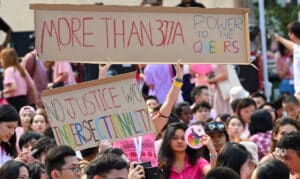Singapore finally ends colonial-era ban on gay sex: ‘This is the right thing to do’

Attendees form the words ‘Repeal 377A’ in lights at the Pink Dot event, 2019. (Getty/ Ore Huiying)
Singapore’s prime minister Lee Hsien Loong has announced an end to Section 377A, the country’s law that criminalises gay sex.
Section 377A of Singapore’s penal code, which bans consensual, same-sex sexual activity between men, was introduced in the 1930s under British colonial rule.
LGBTQ+ activists have fought for years to repeal the archaic gay sex ban, which makes consensual sex punishable with up to two years imprisonment.
On Sunday (21 August), prime minister Lee Hsein Loong announced that Singapore would no longer criminalise sex between men.
During his annual policy address, broadcast on national TV, Lee pointed out that the repeal of 377A was last debated in 2007, at which point the government “stopped short of repealing the law”, and instead decided to “not actively enforce it”.
“It would have been too divisive to force the issue then,” he said.
Lee continued: “Now, 15 years later, attitudes have shifted appreciably. While we remain a broadly conservative society, gay people are now better accepted in Singapore, especially among younger Singaporeans.
“It’s time to ask ourselves again the fundamental question: ‘Should sex between men in private be a criminal offence?'”
Lee acknowledged that “Singaporeans still have differing views on whether homosexuality is right or wrong”, but said that “most people accept that a person’s sexual orientation and behaviour is a private and personal matter, and that sex between men should not be a criminal offence”.
“Private sexual behaviour between consenting adults does not raise any law and order issue,” he said.
“There’s no justification to prosecute people for it, nor to make it a crime… The government will repeal Section 377A and decriminalise sex between men.
“I believe this is the right thing to do and something that most Singaporeans will now accept.
“This will bring the law in line with current social mores and I hope will bring some relief to gay Singaporeans.”
Gay sex will no longer be a crime in Singapore. Finally.
— Terence Lee (@terenceleejx) August 21, 2022
Singapore ending gay sex ban!
The law was inherited from the colonial era, so thank goodness they're finally getting rid of that dinosaur shit.— Gragos 🇹🇭in🇬🇧 (@thai_tuxie) August 21, 2022
what a euphoric moment for my queer brothers in singapore with the repeal of s377A. consensual sex between men will be decriminalised there. the journey might be long but i am happy for you. we are seeing a growing resistance against this colonial homophobic legacy in asia. 🏳️🌈— aidil (@climateaidil) August 21, 2022
SECTION 377A IS REPEALED FINALLY IN SINGAPORE!!!! SEX BETWEEN MEN IS NOW DECRIMINALISED!!!!— 사히라🌙 (@sahirawr) August 21, 2022
However, Lee also said that “only marriages between one man and one woman are recognised in Singapore”, and promised to “uphold and safeguard the institution of marriage”.
The prime minister said if marriage laws face legal challenges, as 377A has done, it would “polarise society”, and that marriage equality would be “bad for Singapore”.

Pride-goers attend the annual Pink Dot event in Hong Lim Park, Singapore on 18 June 2022. (AFP via Getty/ Roslan Rahman)
Leow Yangfa, executive director of the Singaporean LGBTQ+ charity Oogachaga, said: “We are grateful that the Singapore government will repeal Section 377A through parliament. This means a lot to the LGBT community.
“Decriminalisation will not only improve the lives of LGBT people and their families, but will bring other obvious benefits to business, trade and Singapore’s international reputation, making this announcement welcome on many fronts.
“We eagerly look forward to constructive debate in Parliament in the coming months.”
Téa Braun, chief executive of the Human Dignity Trust, said in a statement: “Section 377A is both archaic and discriminatory. Because of this announcement, gay men can look forward to no longer being presumed criminals, and Singapore has decisively moved past persecuting people on the basis of their sexual orientation.
“This decision is incredibly significant not only for Singapore but for its wider signalling effect across Asia and the world, where millions of people are still criminalised based on their sexual orientation or gender identity.
“The tide continues to turn decisively against countries that maintain these stigmatising laws.”
Several Asian countries are slowly moving away from British colonial laws criminalising LGBTQ+ people. In 2019, Taiwan became the first country in Asia to legalise same-sex marriage, and this year was followed by Thailand.

